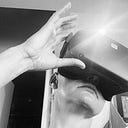How Augmented Reality Can Change the World
Bold title, I know. And as someone who considers herself allergic to grand, sweeping statements like the one I just made, I understand if you’re skeptical. But the more I turn augmented reality over in my head, the more I think about broader implication beyond selling products and engaging customers (though don’t get me wrong, it’s amazing for that, I want to keep my day job). Augmented reality could lead to a revolution in the way we communicate — and provide a path to inclusion for people with learning challenges and the illiterate.
According to UNICEF data, almost 10% of the world’s population can be considered illiterate, and women are disproportionately less likely to be able to read than men. Add to those millions of people, many of whom are in rapidly developing countries, the number of people who struggle with reading and those who are in countries where they don’t speak the dominant language, and the number balloons. Using more contextual and image driven augmented reality applications would allow for these people to participate more fully in society, creating net benefits for everyone.
Many refugees and migrants, for instance, lack language skills when they first arrive in new countries, and plenty of them also lack functional literacy as well. If they were able to use smart devices to navigate their lives, they could more quickly be integrated into their new environments, and perhaps learn simple job skills using AR to mimic with work they would be doing. Even if women were prevented from working outside the home, for instance, they could use visual cues to navigate the city and seek resources for their daily lives.
In developing countries, AR could be used to lift people out of poverty but providing basic, visually driven skills training, as well as a way to communicate with the wider world. But beyond that, it provides something less tangible but more important — an end to isolation. We live in a text based world right now, and if the text is unreadable, you can’t function to your highest capacity. If you are given a way to navigate the world that is understandable, it will get you out of the bubble and into society, and perhaps give you the confidence to go forth and learn how to read text.
Augmented reality will never replace reading, of course, and nor should it. But it can add an extra layer on top of the world to make it more welcoming and comprehensible for some of the most disenfranchised among us, and that’s reason enough to lean in and start experimenting. If just one woman can learn a skill that gives her ability to escape a bad relationship, or one man can learn how to navigate a strange and scary city and feel more included, then that will be enough.
